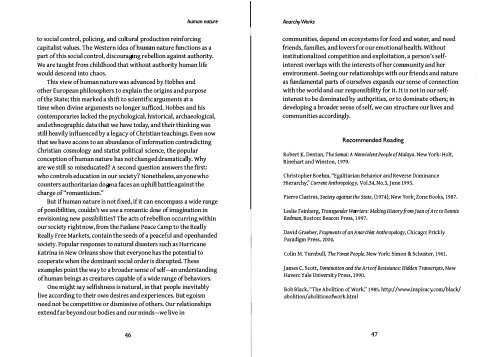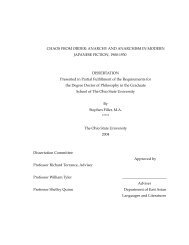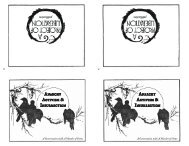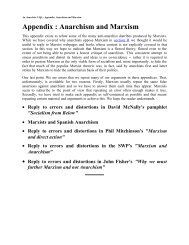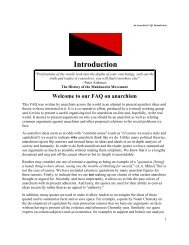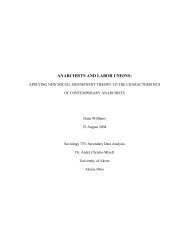Anarchy Works.pdf - Infoshop.org
Anarchy Works.pdf - Infoshop.org
Anarchy Works.pdf - Infoshop.org
You also want an ePaper? Increase the reach of your titles
YUMPU automatically turns print PDFs into web optimized ePapers that Google loves.
human nature<br />
<strong>Anarchy</strong> <strong>Works</strong><br />
to social control, policing, and cultural production reinforcing<br />
capitalist values. The Western idea of human nature functions as a<br />
part of this social control, discouraging rebellion against authority.<br />
We are taught from childhood that without authority human life<br />
would descend into chaos.<br />
This view of human nature was advanced by Hobbes and<br />
other European philosophers to explain the origins and purpose<br />
of the State; this marked a shift to scientific arguments at a<br />
time when divine arguments no longer sufficed. Hobbes and his<br />
contemporaries lacked the psychological, historical, archaeological,<br />
and ethnographic data that we have today, and their thinking was<br />
still heavily influenced by a legacy of Christian teachings. Even now<br />
that we have access to an abundance of information contradicting<br />
Christian cosmology and statist political science, the popular<br />
conception of human nature has not changed dramatically. why<br />
are we still so miseducated? A second question answers the first:<br />
who controls education in our society? Nonetheless, anyone who<br />
counters authoritarian dogma faces an uphill battle against the<br />
charge of "romanticism:'<br />
But if human nature is not fixed, if it can encompass a wide range<br />
of possibilities, couldn't we use a romantic dose of imagination in<br />
envisioning new possibilities? The acts of rebellion occurring within<br />
our society right now, from the Faslane Peace Camp to the Really<br />
Really Free Markets, contain the seeds of a peaceful and openhanded<br />
society. Popular responses to natural disasters such as Hurricane<br />
Katrina in New Orleans show that everyone has the potential to<br />
cooperate when the dominant social order is disrupted. These<br />
examples point the way to a broader sense of self-an understanding<br />
of human beings as creatures capable of a wide range of behaviors.<br />
One might say selfishness is natural, in that people ineVitably<br />
live according to their own desires and experiences. But egoism<br />
need not be competitive or dismissive of others. Our relationships<br />
extend far beyond our bodies and our minds-we live in<br />
communities, depend on ecosystems for food and water, and need<br />
friends, families, and lovers for our emotional health. Without<br />
institutionalized competition and exploitation, a person's selfinterest<br />
overlaps with the interests of her community and her<br />
environment. Seeing our relationships with our friends and nature<br />
as fundamental parts of ourselves expands our sense of connection<br />
with the world and our responsibility for it. It is not in our selfinterest<br />
to be dominated by authorities, or to dominate others; in<br />
developing a broader sense of self, we can structure our lives and<br />
communities accordingly.<br />
Recommended Reading<br />
Robert K. Dentan, The Semai; A Nonviolent People of Malaya. New York: Holt,<br />
Rinehart and Winston, 1979.<br />
Christopher Boehm, "Egalitarian Behavior and Reverse Dominance<br />
Hierarchy:' Current Anthropology, Vo1.34, No.3, June 1993.<br />
Pierre Clastres, Society against the State, (1974), New York: Zone Books, 1987.<br />
Leslie Feinberg, Transgender Warriors; Making History from Joan of Arc to Dennis<br />
Rodman, Boston: Beacon Press, 1997.<br />
David Graeber, Fragments of an Anarchist Anthropology, Chicago: Prickly<br />
Paradigm Press, 2004.<br />
Colin M. Turnbull, The Forest People, New York: Simon & Schuster, 1961.<br />
James c. Scott, Domination and the Arts of Resistance; Hidden Transcripts, New<br />
Haven: Yale University Press, 1990.<br />
Bob Black, "The Abolition of Work;' 1985. http:!hvww.inspiracy.com/black!<br />
abolition! abolitionofwork.html<br />
46<br />
47


